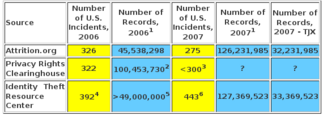 Bruce Schneier hits the nail on the head:
Bruce Schneier hits the nail on the head:
If privacy and security really were a zero-sum game, we would have seen mass im migration into the former East Germany and modern-day China. While it’s true th at police states like those have less street crime, no one argues that their ci tizens are fundamentally more secure.There’s more, all well worth reading.We’ve been told we have to trade off security and privacy so often — in debate s on security versus privacy, writing contests, polls, reasoned essays and poli tical rhetoric — that most of us don’t even question the fundamental dichotomy .
But it’s a false one.
Security and privacy are not opposite ends of a seesaw; you don’t have to accep t less of one to get more of the other. Think of a door lock, a burglar alarm a nd a tall fence.
— What Our Top Spy Doesn’t Get: Security and Privacy Aren’t Opposites, Bruce Schneier, Wired, 01.24.08 | 12:00 PM
Here’s the gist:
The debate isn’t security versus privacy. It’s liberty versus control.Haven’t we lost enough already?You can see it in comments by government officials: “Privacy no longer can mean anonymity,” says Donald Kerr, principal deputy director of national intelligen ce. “Instead, it should mean that government and businesses properly safeguard people’s private communications and financial information.” Did you catch that? You’re expected to give up control of your privacy to others, who — presumabl y — get to decide how much of it you deserve. That’s what loss of liberty look s like.
-jsq



